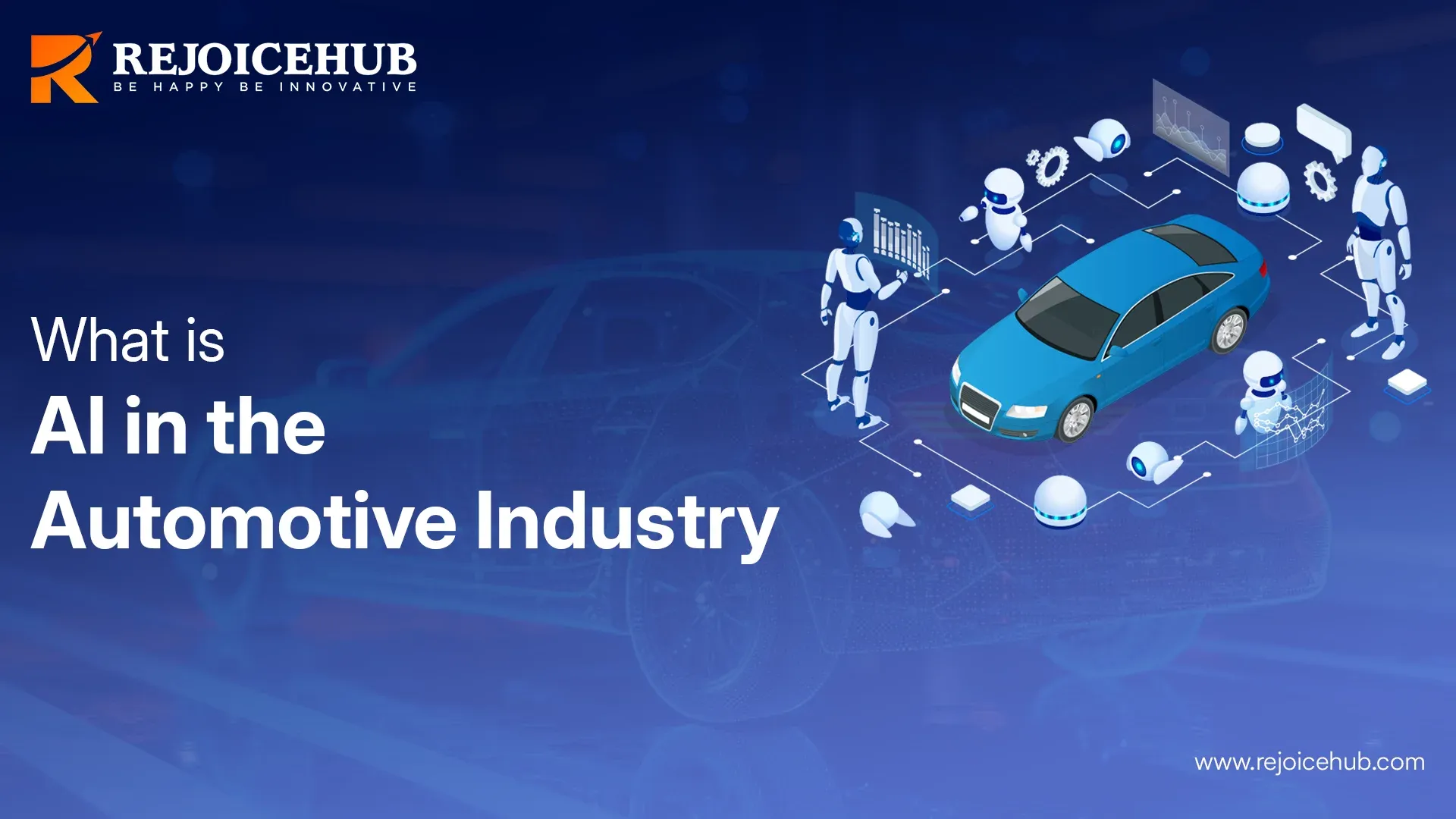
Artificial Intelligence has changed many industries. The automotive industry is also part of it. In recent years, AI has moved from research labs into cars, factories, and even maps. Today, AI shapes design, safety, and the user experience. It guides vehicles, predicts faults, and personalizes rides. This guide offers a complete view of AI in the automotive world. It speaks in simple terms and clear sentences. It moves from basics to future visions.
Quick Summary
Automotive AI uses data and smart algorithms. It helps cars drive themselves. It predicts when parts will fail. It tailors features to each driver. It also boosts safety on the road. AI works in vehicle operations and factories. It links with 5G for faster data flow. It overcomes human limits in speed and precision. It offers many benefits. These include lower costs and higher safety. It also unlocks new services and features. Yet, it faces hurdles. Data privacy, regulation, and ethics matter. The future points to more autonomous functions and smarter systems.
What Is AI in Automotive Industry?
AI in automobile industry refers to systems that mimic human thinking. These systems learn from data. They make decisions. They spot patterns. They guide vehicles. They optimize production. They shape customer support. A simple example of artificial intelligence in automobile industry is a voice assistant in a car. A complex one is a self-driving car. In each case, sensors collect data. Cameras, radars, and LiDARs feed raw inputs. Software processes them. It then issues commands. That is AI at work.
How AI Works in Automotive?
AI in vehicles relies on algorithms. An algorithm is a set of rules. It tells a computer how to solve a problem. In cars, AI uses three main types of algorithms: decision matrix, clustering, and regression. Each serves a purpose.

1. AI Algorithms
AI algorithms are step-by-step computational methods used by machines to simulate human intelligence, such as learning, reasoning, and problem-solving.
2. Decision Matrix Algorithms
These algorithms help in making choices. They weigh options against criteria. An example is route planning. The software evaluates time, traffic, and distance. It then picks the best path. Another example is energy management in electric cars. The algorithm balances speed with battery life.
3. Cluster Algorithms
Cluster algorithms group similar data points together. In automotive QC, they spot defects that look alike. They also help in market analysis. They group customers by buying habits. Manufacturers then tailor sales plans.
4. Regression Algorithms
Regression predicts numeric values. In vehicles, regression models forecast fuel consumption. They predict battery life in EVs. They also estimate wear and tear on parts. This helps in planning maintenance.
How Is AI Transforming the Future of the Automobile Industry?
Artificial Intelligence is revolutionizing the automobile industry by enabling autonomous driving, enhancing vehicle safety, optimizing manufacturing processes, and personalizing the driving experience. From smart navigation systems to predictive maintenance, AI is driving innovation and shaping the future of mobility. AI changes nearly every aspect of this field. It affects operations, communication networks, safety limits, and the ride experience itself.
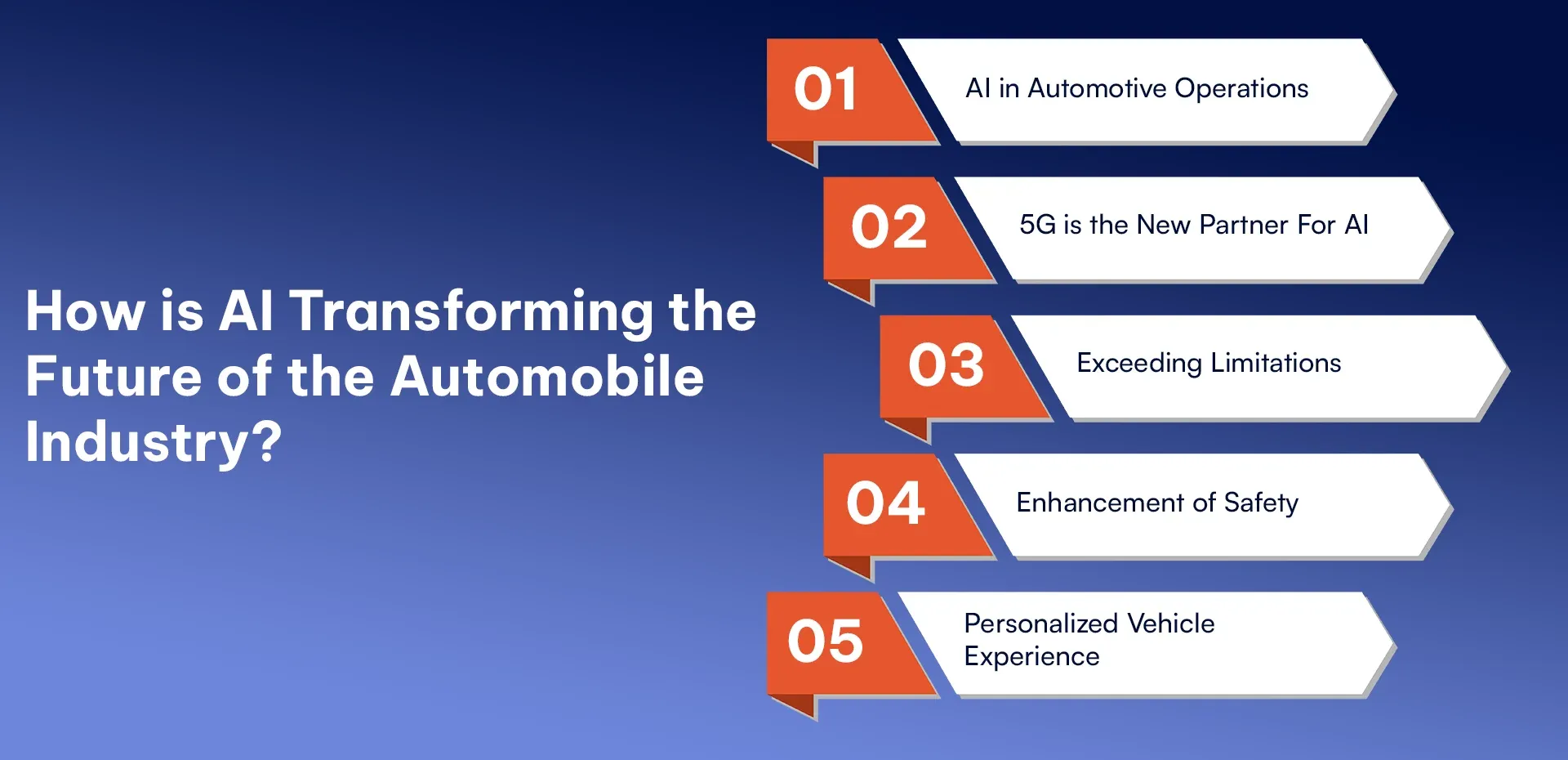
1. AI in Automotive Operations
AI manages production lines. Robots inspect welds on car bodies. Cameras feed images to AI. The AI flags irregularities. This cuts down errors. It also speeds up production. AI plans supply orders. It tracks parts across the globe. It predicts delays and reroutes shipments.
2. 5G Is the New Partner for AI
5G offers high data speed. It links AI systems in cars to the cloud. Cars can offload heavy tasks. They send data to powerful servers. They get instant feedback. This enables real-time navigation updates. It also boosts over-the-air software patches.
3. Exceeding Limitations
Human drivers have limits. They grow tired. They react slowly. AI does not. It monitors the road without fatigue. It reacts within milliseconds. It senses hazards before a human can. It also handles complex data from multiple sensors at once.
4. Enhancement of Safety
AI spots danger faster than humans. Many systems warn drivers of lane departures. Others apply brakes to avoid collisions. Some monitor driver fatigue. They alert drivers to rest when needed.
5. Personalized Vehicle Experience
AI tailors settings for each driver. It learns preferences over time. It adjusts seat position, mirror angles, and climate control. It curates music and navigation routes. It even recognizes voices.
Also Read: AI in Gaming Industry: Use Cases, Benefits, and More
Key Benefits of AI in the Automotive Industry
AI is transforming the automotive industry by enhancing vehicle safety, improving manufacturing efficiency, enabling autonomous driving, and personalizing the driving experience. It helps predict maintenance needs, optimize supply chains, and accelerate innovation across the sector.
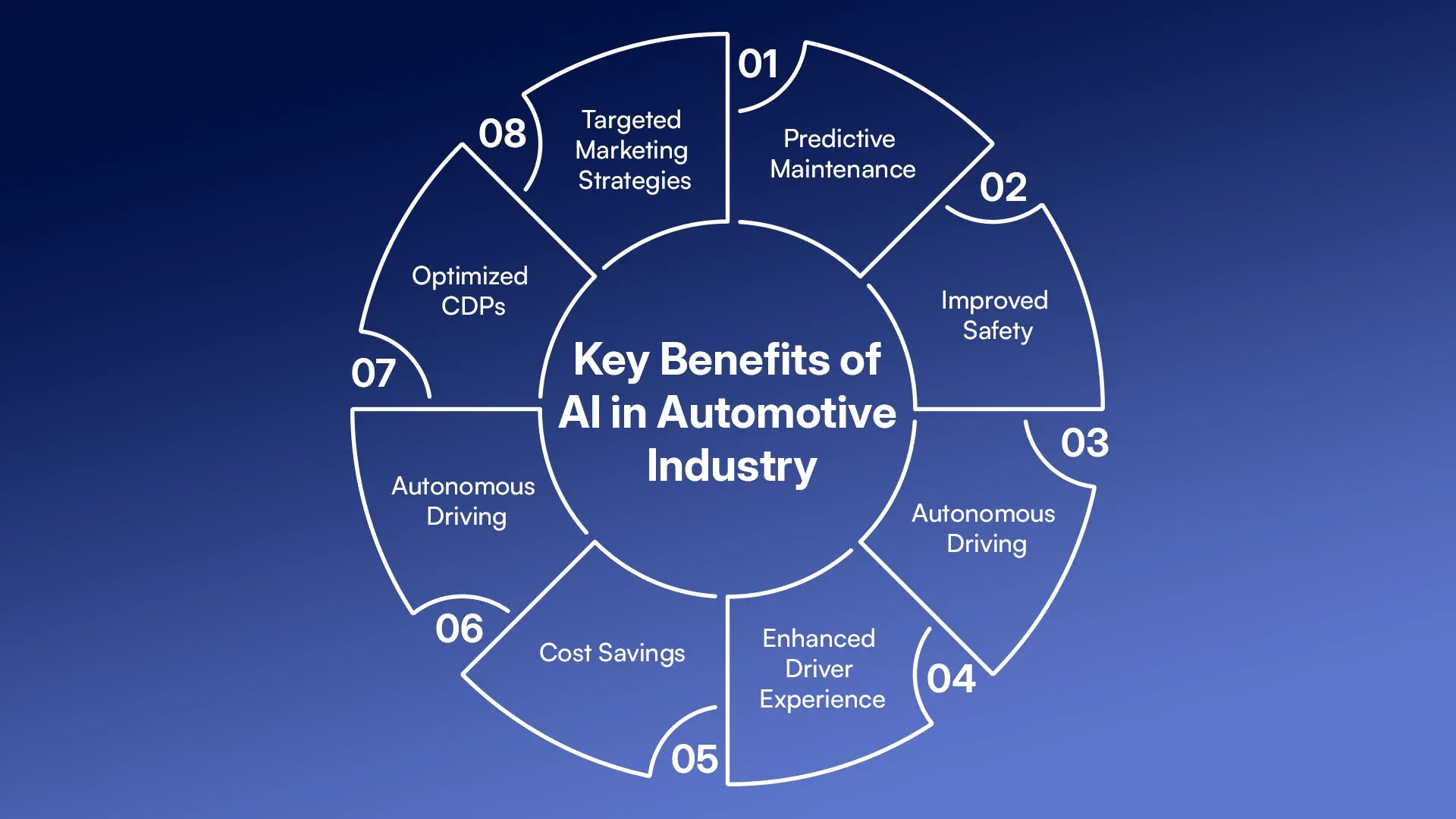
1. Predictive Maintenance
AI tracks vehicle health. It flags issues before they occur. It predicts when parts may fail. This avoids sudden breakdowns. It lowers repair costs. It also reduces downtime for fleets.
2. Improved Safety
AI systems guard the vehicle. They warn of obstacles. They automate braking. They adapt speed to road conditions. They monitor the driver. They watch eye movement and alertness.
3. Autonomous Driving
Self-driving cars rely heavily on AI. They use deep learning to interpret sensor data. They map roads in real time. They plan safe maneuvers. They follow traffic rules.
4. Enhanced Driver Experience
AI interfaces speak natural language. They understand intent. They provide clear guidance. They offer recommendations. They also link to personal devices.
5. Cost Savings
AI streamlines operations. It reduces waste in factories. It optimizes supply chains. It predicts maintenance needs. It cuts fuel usage. These together save money.
6. Autonomous Driving
Autonomous driving refers to the technology that enables vehicles to operate and navigate without human input by using sensors, cameras, artificial intelligence, and machine learning. These self-driving systems can detect their surroundings, make decisions, and control the vehicle to ensure safe and efficient travel.
7. Optimized Customer Data Platforms (CDPs)
AI refines customer data. It merges sales, service, and behavior insights. It then helps tailor promotions. It boosts engagement and loyalty.
8. Targeted Marketing Strategies
With AI, dealerships send offers that matter. They analyze buying patterns. They forecast demand. They avoid generic ads. They focus on individual needs.
Use Cases of AI in the Automotive Industry
AI is transforming the automotive industry by enhancing vehicle safety, enabling autonomous driving, optimizing manufacturing processes, improving predictive maintenance, and personalizing in-car experiences. From smart navigation to intelligent quality control, AI is driving innovation and efficiency across the sector. so Real-world examples show how AI applies across the value chain.
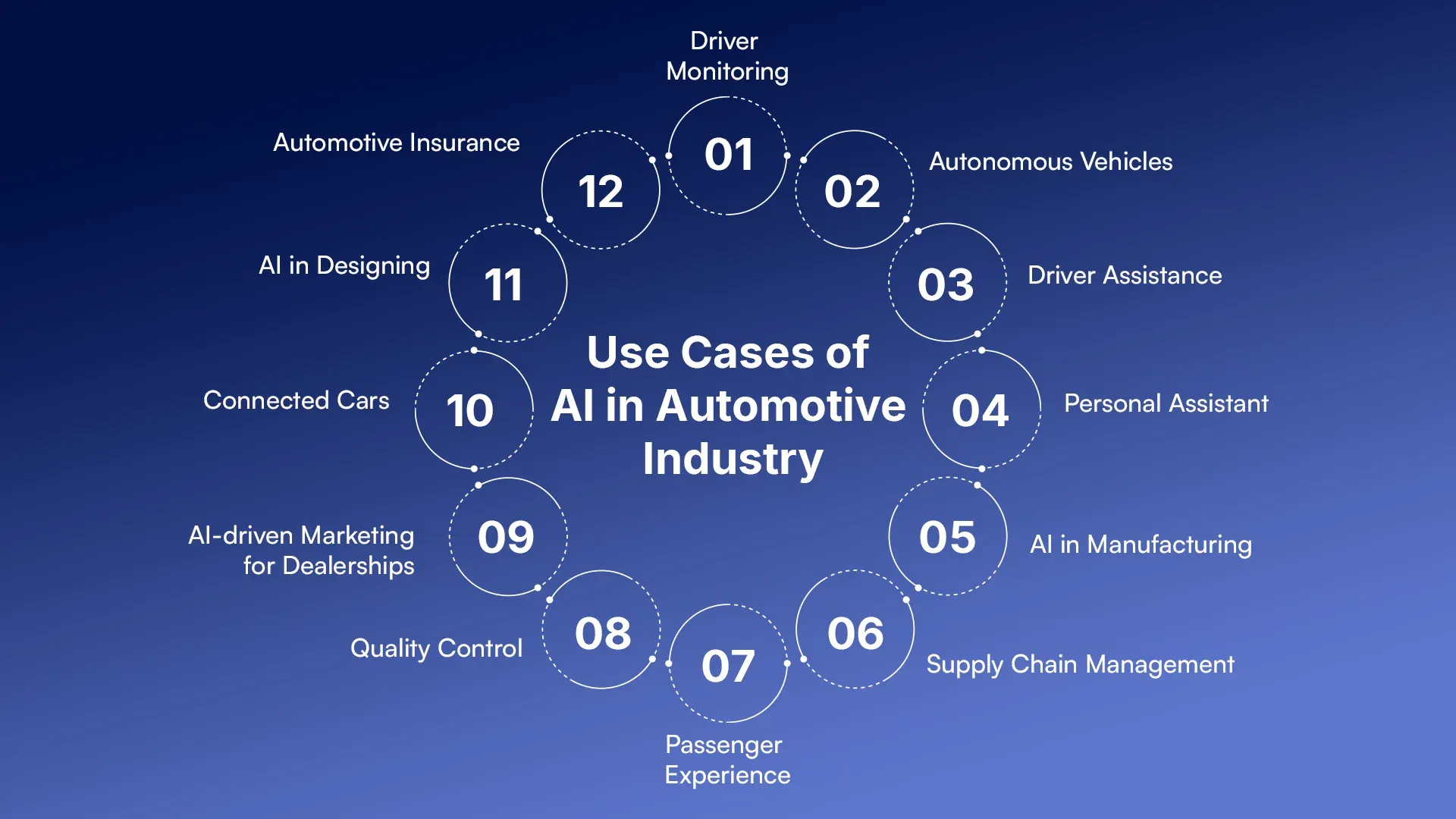
1. Driver Monitoring
Cameras and AI watch drivers. They track gaze, eyelid movement, and posture. They detect fatigue and distraction. They then alert the driver or a remote supervisor.
2. Autonomous Vehicles
Companies test self-driving cars on public roads. AI fuses data from radar, cameras, and LiDAR. It builds a 3D map. It identifies objects. It makes split-second driving choices.
3. Driver Assistance
Features like adaptive cruise control use AI. They keep a safe distance from the car ahead. They adjust speed automatically.
4. Personal Assistant
Voice agents in cars understand commands. They set destinations. They make calls. They play media. They even read texts aloud.
5. AI in Manufacturing
AI drives robots in assembly lines. It inspects weld quality. It optimizes robot paths. It reduces cycle times.
6. Supply Chain Management
AI predicts demand for parts. It optimizes inventory levels. It routes shipments to avoid congestion. It flags potential delays.
7. Passenger Experience
Connected cars offer entertainment and internet services. AI suggests routes based on traffic and user history. It adapts climate control for comfort.
8. Quality Control
AI cameras inspect paint jobs. They spot defects invisible to the human eye. They reject faulty units instantly.
9. AI-Driven Marketing for Dealerships
AI scans social media and browsing patterns. It finds leads. It scores them. Sales teams then focus on high-value prospects.
10. Connected Cars
Vehicles exchange data with each other and with infrastructure. AI uses this to warn of hazards ahead. It plans optimal routes.
11. AI in Designing
AI tools help design car exteriors and interiors. They generate new shapes. They run simulations on aerodynamics.
12. Automotive Insurance
Insurers use AI to assess risk. They analyze driving behavior. They process claims faster with image recognition. They detect fraud.
Also Read: What is AI in Marketing? A Complete Guide
Role of AI in the Evolution of the Automotive Industry
Artificial Intelligence (AI) is transforming the automotive industry by driving advancements in autonomous vehicles, predictive maintenance, smart manufacturing, and personalized customer experiences. From enhancing safety features to streamlining production, AI is reshaping how cars are designed, built, and driven, leading the industry into a smarter, more efficient future. AI’s impact spans design, service, and manufacturing.

-
Transformation in Vehicle Design and Features
AI offers new design tools. It generates concepts based on data. It predicts which features users want. It helps engineers refine parts faster.
-
Disruption in Service and Maintenance
AI chatbots handle customer queries. They book service slots. They answer routine questions. They free staff for complex tasks.
-
Impact on Automotive Manufacturing
Smart factories use AI for quality checks. They adapt production lines on the fly. They cut energy use. They boost output.
Artificial Intelligence for Vehicle Safety
Artificial Intelligence for Vehicle Safety enhances driver and passenger protection by using advanced algorithms to detect hazards, prevent collisions, monitor driver behavior, and assist with real-time decision-making for safer driving experiences.Safety is a prime focus in every industry. AI systems save lives in several ways.
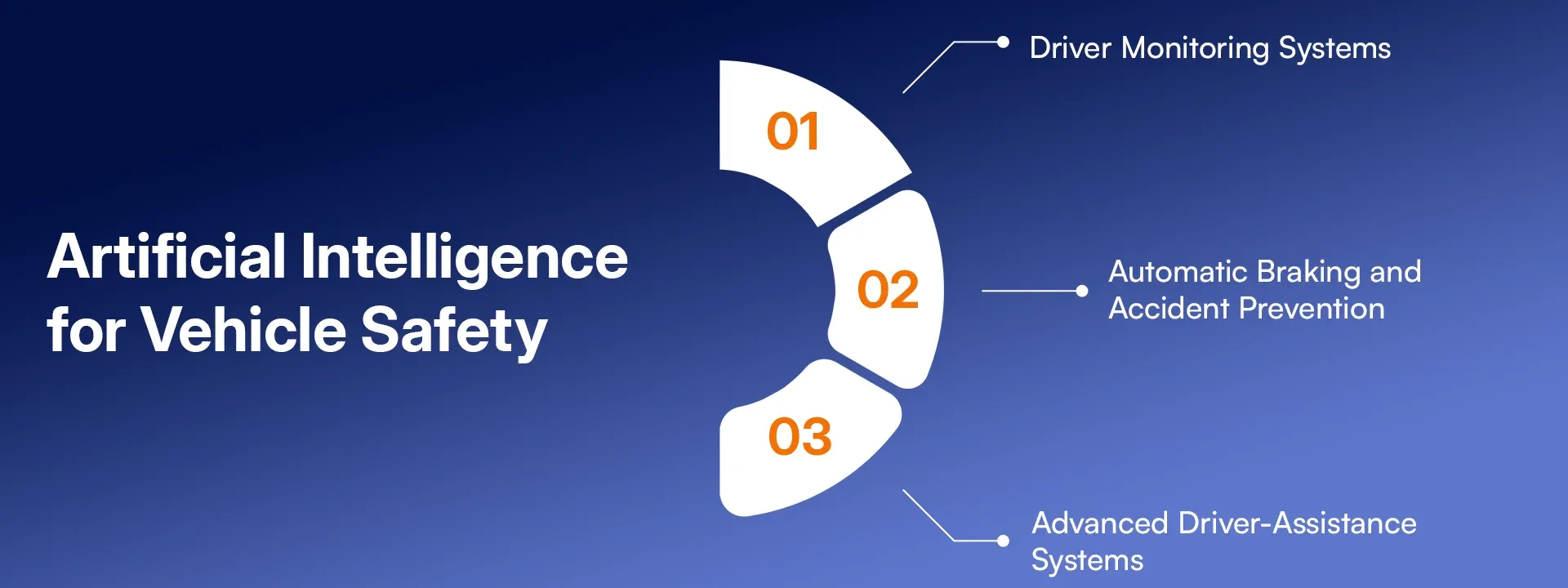
-
Driver Monitoring Systems
These systems observe driver behavior. They check for drowsiness. They alert the driver to rest. They reduce accident risk.
-
Automatic Braking and Accident Prevention
AI cameras detect pedestrians and vehicles. They trigger brakes if a collision is imminent. They reduce crash rates.
-
Advanced Driver-Assistance Systems
ADAS includes lane-keeping assist, blind-spot detection, and adaptive cruise control. All rely on AI to process sensor data. They correct driver errors before danger arises.
Ethical Considerations & Challenges of AI in Automotive Industry
Explores the ethical concerns and challenges of AI in the automotive industry, including safety, data privacy, accountability, and the impact on jobs and human decision-making.
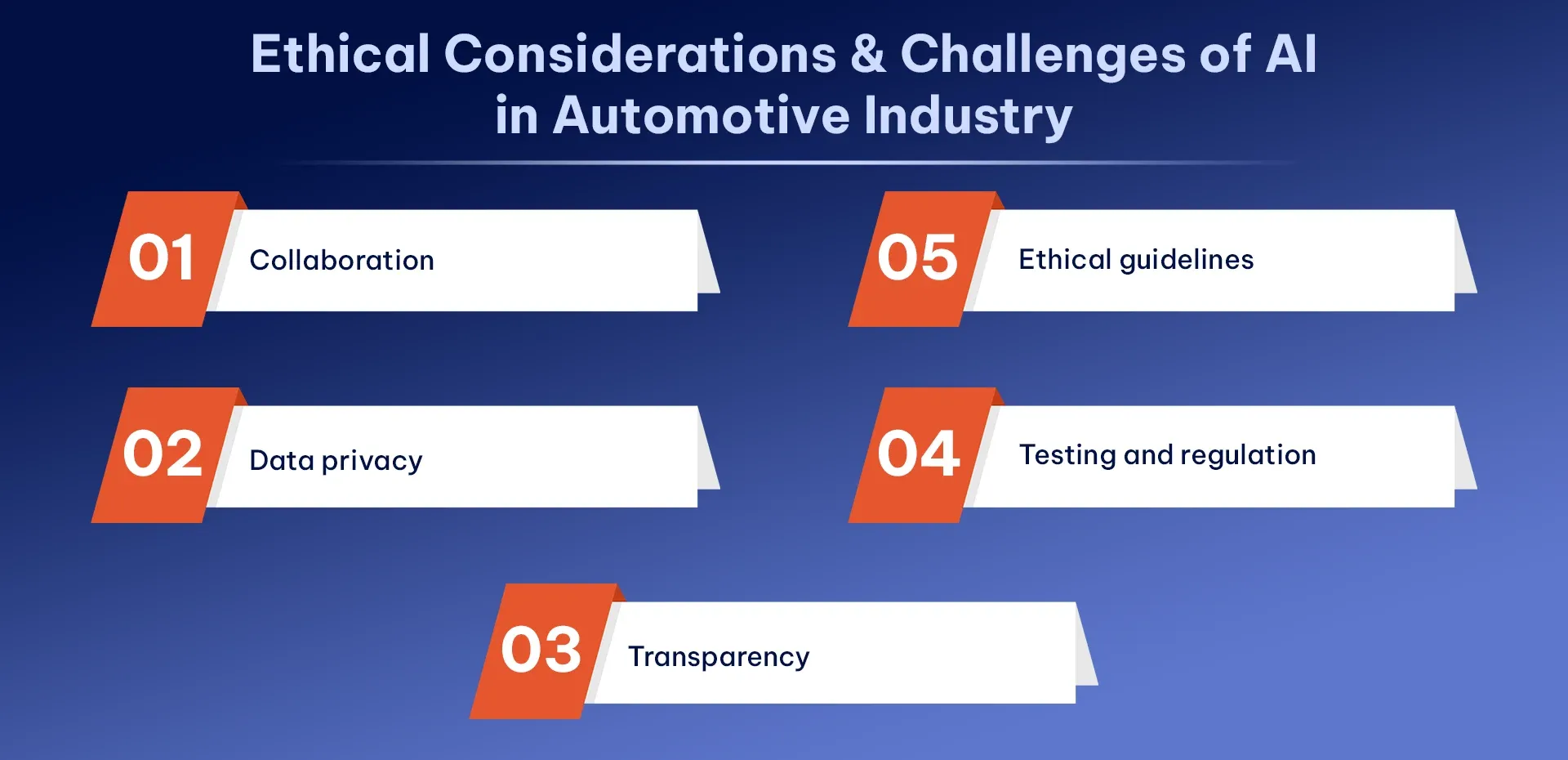
1. Collaboration
Automakers, tech firms, and regulators must work together. They need shared standards. They need common safety benchmarks.
2. Data Privacy
Connected cars gather vast personal data. This includes location, habits, and biometrics. Protecting this data is vital. OEMs must follow privacy laws. They must encrypt and secure data.
3. Transparency
AI decisions can be hard to explain. Regulators and consumers demand clarity. Explainable AI methods help. They trace how a decision was made.
4. Testing and Regulation
Self-driving cars need rigorous testing. They must meet safety rules before public use. Regulators must update standards for AI systems.
5. Ethical Guidelines
AI may face moral dilemmas. For instance, how should a car choose between two accident outcomes? Industry consensus on ethics helps. Codes of conduct guide developers.
What Is the Future of AI in the Automotive Industry?
The road ahead is full of promise. AI will enable fully autonomous vehicles in more cities. It will optimize traffic flow at a city level. It will integrate with smart grids for energy management. AI will support ride-hailing fleets with dynamic pricing. Virtual reality will merge with AI for in-car entertainment. Predictive analytics will become more precise. AI will also shape new business models, such as mobility-as-a-service.
Conclusion
AI has become a core part of the automotive world. It powers design, production, and after-sales. It boosts safety, comfort, and efficiency. It reshapes how people move. Yet, it brings new challenges. Data privacy, ethics, and regulation require care. Collaboration across the industry is key. The future promises even greater feats. The next decade will see smarter cars, smarter roads, and smarter services. AI will continue to steer the automotive industry toward new horizons. For businesses looking to harness this potential, RejoiceHub offers advanced AI development services tailored to automotive innovation and transformation.
Frequently Asked Questions
What is AI in the automobile industry?
AI in this field refers to systems that mimic human thought. They learn from data. They make decisions. They guide vehicles and processes.
How does AI improve vehicle safety?
AI watches driver behavior. It detects drowsiness. It warns of lane drift. It automates braking to avoid collisions.
What are the main AI algorithms used in automotive?
The key types are decision matrix, cluster, and regression algorithms. Each handles choices, grouping, or prediction tasks.
How does 5G aid automotive AI?
5G offers fast, low-latency links. Cars can send data to the cloud and get instant feedback. This supports real-time updates.
What future trends will shape automotive AI?
Expect fully autonomous vehicles, smart traffic systems, integrated energy management, and new mobility-as-a-service offerings.
